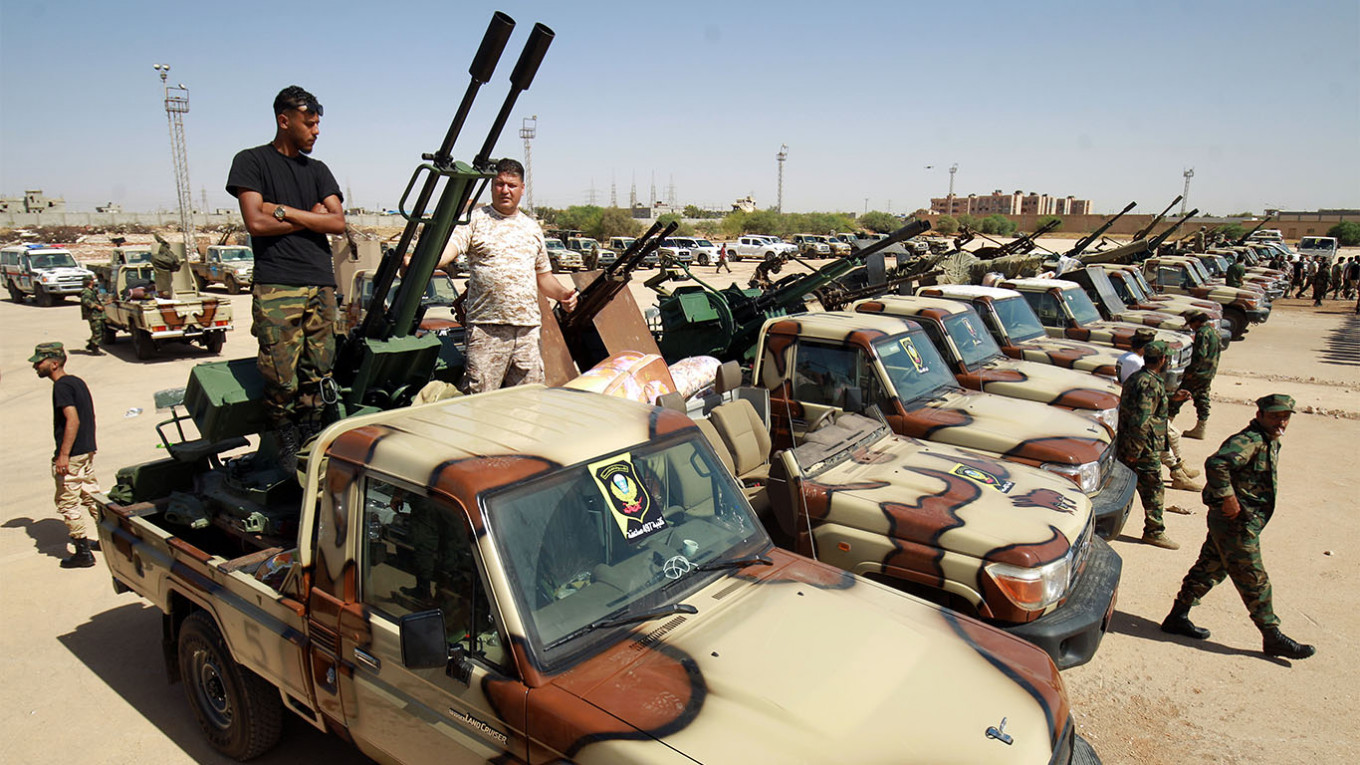On August 21, the latest ceasefire in Libya’s long war between the Government of National Accord (GNA) of Fayez al-Sarraj and the Libyan National Army of Khalifa Haftar took effect.
The main force behind the new ceasefire was the United States, even though it was just a few months ago that Russia and Turkey appeared to be in control of the peace process. Washington’s successful mediation has led many to ask whether Moscow has lost the initiative in Libya and is at risk of squandering the gains it has made there in recent years.
The fighting in Libya effectively stopped back in early June, when Turkish-backed GNA forces repelled a fourteen-month assault on Tripoli by Haftar’s men and cleared the country’s west of them.
Russia and Turkey tried, but failed, to secure a ceasefire. A previous diplomatic effort in January had fallen through because of Haftar’s intransigence, but now the obstacle was Sarraj’s resistance—a hurdle seemingly overcome by the United States, whose role in the conflict has grown in recent months.
Haftar has alienated many external actors with his unpredictability, insubordination, and tendency to make snap decisions. However, he remains a key figure in Libya, one for whom his foreign backers have yet to find an adequate replacement.
Haftar is often and wrongly called a Russian satrap. The myth that Russia sees in Haftar a Libyan Bashar al-Assad was born in 2016, when Haftar twice visited Moscow, fueling speculation that Russia had agreed to supply Haftar with weapons in exchange for a naval base in Tobruk or Benghazi.
It is highly likely that Haftar asked Russia for arms to use in his operations against Islamists, and it is not out of the question that Moscow may at some point have contemplated opening a base in Libya, especially before its active expansion of the base at Tartus. After all, military experts say that Tobruk is a better site for a base than Tartus. But Russia has no need for two Mediterranean bases—at least not yet—and Russian diplomats have for years denied rumors that Russia seeks a base in Libya.
The myth about Haftar’s subservience to Moscow grew after Admiral Kuznetsov, the Russian aircraft carrier, anchored off the coast of Tobruk in January 2017. Haftar was welcomed aboard for a video conference with Russian Defense Minister Sergei Shoigu—an opportunity for Haftar to demonstrate his strength and influence inside Libya and for Moscow, tempted by the prospect of repeating its success in Syria but wary of Haftar’s long-standing U.S. and CIA ties, to test the waters.
More recently, the role of satrap of Moscow has been ascribed to Aguila Saleh Issa, the speaker of Libya’s House of Representatives who is based in the country’s Haftar-controlled east. Saleh has advanced peace initiatives that he has acknowledged have been coordinated with Russia, and in the summer of 2020 he visited Moscow, receiving a warm welcome and finding support for his peace initiatives from Federation Council Speaker Valentina Matvienko and Foreign Minister Sergey Lavrov.
Yet Saleh’s most recent call for a ceasefire made no mention of Russia—an omission that was surely disappointing to Moscow and its diplomats given Russia’s months-long effort to freeze the front line in Libya.
Russia’s role in Libya’s war has been heavily mythologized. There is no argument that Russia’s experience in Syria has influenced its behavior in the Middle East, and much in Libya recalls Syria: the need to maintain contacts with all sides in the conflict, the close coordination between Russia’s ministries of defense and foreign affairs, and the search for parity between foreign powers.
As in Syria, Turkey has turned out to be a partner to Russia. In fact, since the start of the year, the Russo-Turkish agenda has become increasingly dominated by Libya, to such an extent that Syria is turning into a secondary issue in interactions between the two countries’ presidents, diplomats, and generals.
In both wars, Ankara clearly has a side it favors. Russia’s sympathies, by contrast, are less straightforward. If in Syria, despite its contacts with the opposition, Moscow has clearly sided with the authorities, things are murkier in Libya, where the GNA and the House of Representatives, which appointed Haftar commander-in-chief, are equally legitimate in the eyes of the international community.
In public, Moscow has strived for equidistance from both sides, receiving representatives of both the GNA and the House of Representatives in Russia. Vladimir Putin, unlike a number of European leaders, has declined to receive Haftar yet met with Sarraj, who represented Libya at a Russia–Africa summit held in Sochi in October 2019.
Today, Russia’s Ministry of Defense backs outreach to Haftar, while economic officials favor engagement with Sarraj’s government and the Foreign Ministry holds talks with all sides in the conflict.
Recent visits suggest that relations between Moscow and the GNA, which date back several years, are fairly strained. In early June, GNA deputy prime minister Ahmed Maiteeq and foreign minister Mohamed Taha Siala came to Russia for closed talks. Soon thereafter, news reports cited Maiteeq as having expressed doubts about Moscow’s seriousness in maintaining relations with Tripoli.
Russia takes issue with the GNA’s accusations of support for Haftar, active solicitation of Turkish military aid, and conclusion with Ankara of questionable agreements on the delimitation of maritime boundaries in the Eastern Mediterranean. But it remains committed to dialogue with the GNA, in part because of the prospects for trade and economic cooperation and the fulfillment of contracts awarded during Muammar Gaddafi’s rule.
Here, progress has largely been limited to words and memoranda. From 2018 to 2019, Russia-Libya trade—small to begin with—fell from $200 million to about $150 million. Russian companies, ostensibly put off by the uncertain military and political situation in Libya, are in no hurry to return to the country, even as large Western companies, including the twenty-three foreign oil and gas companies with assets in Libya, operate largely unimpeded by the war.
Rosneft and Libya’s National Oil Corporation (NOC) signed an agreement on oil exploration and production cooperation in 2017. Nothing has been heard about Rosneft’s work in Libya since then. Meanwhile, the NOC has expressed concern about the presence of Russian mercenaries on the site of the country’s largest oil field, El Sharara.
If Turkey has entrenched itself in Libya through agreements with Tripoli, Russia’s presence would appear to boil down to Wagner, the mercenary outfit disavowed by the Kremlin. As Putin said of Wagner during a January press conference with German Chancellor Angela Merkel, “If there are Russian nationals there [in Libya], they do not represent the interests of, or receive funds from, the Russian state.” But Russia has no clear idea of its interests in Libya and what the country is good for beyond a demonstration of the influence Moscow has gained by intervening militarily in Syria.
At some level, Moscow’s approach to the war in Libya—its official position of neutrality and willingness to work with all sides in the conflict—seems successful. Russia may have been peripheral to the latest ceasefire, yet Europe acknowledges its role, as German Foreign Minister Heiko Maas did on a recent trip to Tripoli. After all, the principles of the Berlin Conference—the basis of the Libya peace process—were drawn up with Russia’s active participation.
But what else can Russia achieve in Libya, especially given the United States’ determination to prevent Russia from expanding its political and military influence there? Indeed, Moscow’s involvement in the war may have been the thing that renewed Washington’s attention on Libya. As Jeffrey L. Harrigian, the commander of the U.S. Air Forces in Europe and Air Forces Africa, declared earlier this year: “If Russia seizes bases on Libya’s coast, the next logical step is they deploy permanent long-range, anti-access, area-denial capabilities. If that day comes, it will create very real security concerns on Europe’s southern flank.”
Such comments are to Russia what a red flag is to a bull. Moscow has not forgotten the cause of Gaddafi’s ouster and the chaos that followed: NATO’s 2011 military intervention in Libya and the liberal interpretation of the UN Security Council resolution that authorized it.
Back then, the United States and its allies in Europe had the chance to commit themselves to the postwar reconstruction of Libya as they had previously done in Iraq, however difficult and controversial that undertaking had been. In the end, Libya was abandoned and left to become a failed state and a place where different powers, from local tribes to international corporations, protect their interests.
For now, it remains unclear what Russia is up to in this struggle for oil and other resources, beyond helping its Mideast partners Cairo and Abu Dhabi get what they want in exchange for certain political and economic perks. However, the war—along with other conflicts in the region—is far from over.
This article was first published by the Moscow Carnegie Center.
A Message from The Moscow Times:
Dear readers,
We are facing unprecedented challenges. Russia's Prosecutor General's Office has designated The Moscow Times as an "undesirable" organization, criminalizing our work and putting our staff at risk of prosecution. This follows our earlier unjust labeling as a "foreign agent."
These actions are direct attempts to silence independent journalism in Russia. The authorities claim our work "discredits the decisions of the Russian leadership." We see things differently: we strive to provide accurate, unbiased reporting on Russia.
We, the journalists of The Moscow Times, refuse to be silenced. But to continue our work, we need your help.
Your support, no matter how small, makes a world of difference. If you can, please support us monthly starting from just $2. It's quick to set up, and every contribution makes a significant impact.
By supporting The Moscow Times, you're defending open, independent journalism in the face of repression. Thank you for standing with us.
Remind me later.








